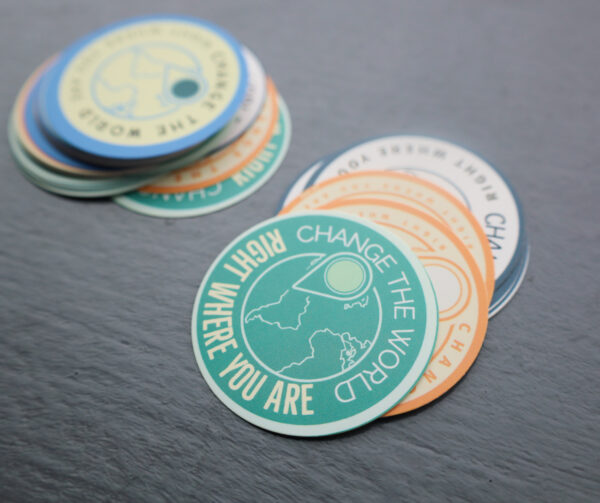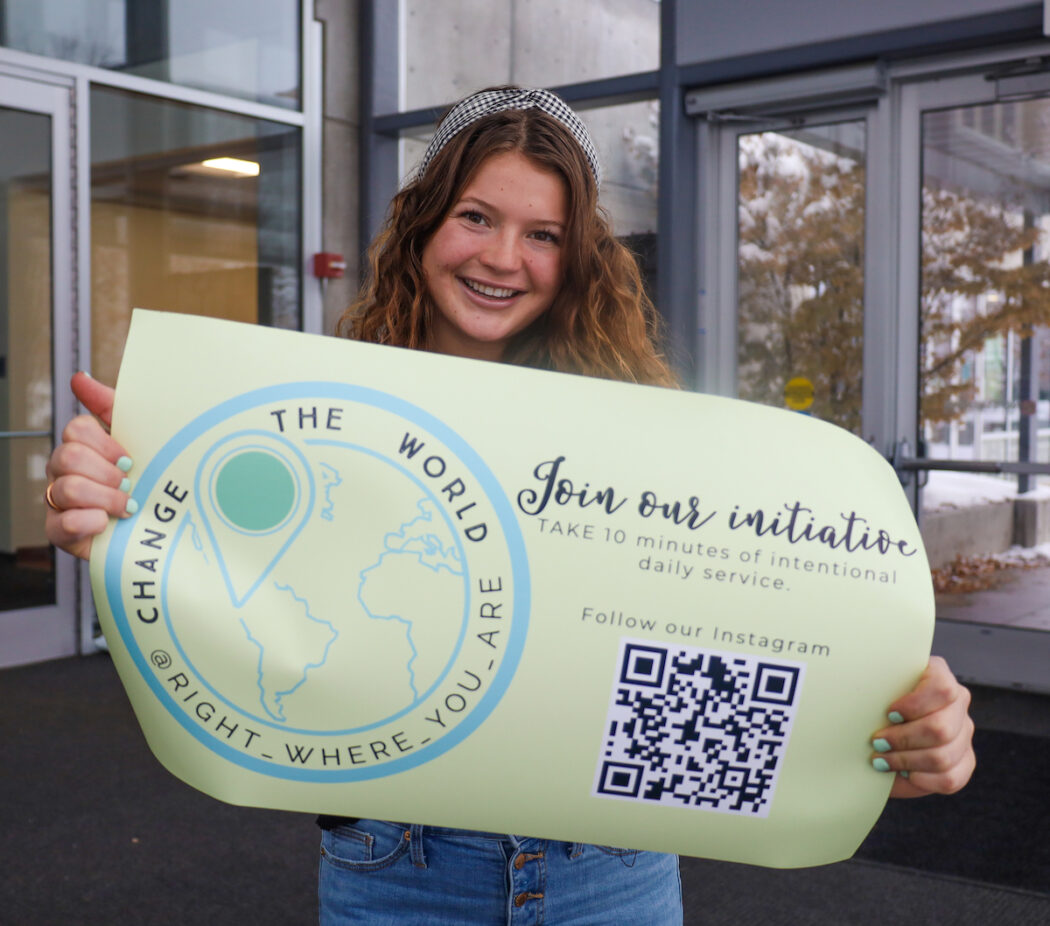USU student Brynlee Barker works to change the world right where she is
On the lawn of the Mount Timpanogos Temple in Utah, Brynlee Barker gathered her family together to announce where she would spend 18 months serving and sharing the message of the Church of Jesus Christ of Latter-day Saints.
Choked up with tears, she announced where she was called to serve her mission: Montevideo, Uruguay.
But she would never make it there.
Ever since she was a kid, Barker wanted to do something to change the world. She thought going to a foreign country would be her chance.
Barker received her mission assignment in April 2020. Due to the pandemic, most Latter-day Saint missionaries at the time were being reassigned from foreign countries to missions closer to home.
Barker was reassigned to serve in Everett, Washington, and she hoped every day a call would come, telling her she could serve where she was originally assigned.
Only three weeks before she was to return home, Uruguay opened its borders, but by that point, it was too late. Barker had to change her mindset and figure out how she could change the world from Washington.
“I had to change what I thought the definition was of making a difference in the world,” she said. “So every day I kind of just was like, ‘OK, what good can I do today?’”
Barker never made it to Uruguay, but she learned to love Washington.
“I don’t think I would have loved it the way I did had I not learned that lesson to be where I was and to find the good I could do right where I was,” she said. “Not where I wanted to be, not where I thought I should be, but right where I was today.”
What she learned on her mission inspired her to create an online initiative, Change the World Right Where You Are. Started in January, the initiative’s Instagram page now has more than 400 followers, who are encouraged by Barker to take 10 intentional minutes a day to do something good.
Ally Haws and Dacia Rothwell both met Barker when they had just returned from their own missions and were struggling with the transition. All three of them had spent the last 18 months serving others, and it was difficult to go back to “real life” and find a new purpose.
“When you’re serving others, you find yourself so much deeper,” Haws said. “When that’s gone, it’s like I don’t know who I am.”
Latter-day Saint missionaries are assigned to be with another missionary — their “companion” — at all times. After constantly being with someone else, coming home can feel incredibly lonely.
“You feel like you’re the only one who knows how you’re feeling in that transition,” Rothwell said. “It’s super cool because we were all able to become friends through that transition to be like, ‘Wait, we all feel the same way, and we can continue the good that we did and just find a new way to fit it into our lives every day.’”
Barker found a way to fit doing good into her everyday life in a leadership class at Utah State University during her first semester after her mission.
The professor, Bret Crane, challenged everyone in the class to do a 10-hour service project. Barker was excited about the project, but she quickly discovered what she really wanted to do would take more than 10 hours.
“Yes, those 10 hours would make a difference, but I wanted to find something that I could keep doing with my life,” she said.
Her idea was to simplify making a difference by encouraging people to take 10 minutes a day to do good. She started the initiative by asking people for stories.
“I started asking people for stories of how they had seen the world become a better place and what had made a difference in their world by something that they had done for someone, or something that someone had done for them,” Barker said. “Soon enough, I was getting all these stories from people.”
The initiative’s Instagram page shares those stories and gives simple service invitations, such as getting to know your bus driver or doing something to make the world more beautiful.
“I realized most people were a lot like me, where they thought that to make a difference, you had to have money,” Barker said. “You had to have a lot of time. You couldn’t be a broke college kid, and you had to figure out a lot of different elements to do good, but it’s so much more simple.”
One person reached out to thank Barker for a service invitation, which was to reach out to a friend over text. This person texted his friend to check in and discovered he was planning to commit suicide that day. The text saved his life.
“Hearing stories like that is why I’m doing this,” Barker said.
Haws said the challenge of taking 10 minutes a day to do good is subconsciously in her mind now. One day while out shopping, she saw some cupcakes at the store and thought to spend an extra few dollars and drop them off with some friends on the way home.
“That took seriously, like, 10 extra minutes out of my day to just stop by their apartment on the way home versus just driving straight home,” she said. “Having that reminder — not only does it help them, but it helps me because you feel better when you serve.”
Though it started as a class project, Barker’s initiative has grown beyond that. Rothwell and Haws both said they admire how Barker genuinely wants to change the world — it’s not just about looking like a good person.
“She just made it into a whole project that she sincerely wanted to do,” Rothwell said. “She wasn’t doing it just to do it, to have people look at her through that. She wanted to do it out of the goodness of her heart.”
Barker recently headed up a scholarship fundraiser with her fellow students in the Huntsman Scholar Program, a highly selective program for undergraduate business students at USU.
Chalon Keller is the mentor of 25 students in the program, including Barker. Keller and the student leader of her group, Adam Smith, decided to start a scholarship fund, which the students in their group would raise money for.
The students were split into teams of five, and each team was required to start a “micro-business” to earn as much money for the scholarship as they could in a few hours.
Barker was chosen to lead her team. She had already designed stickers to remind people of the daily 10-minute challenge, so she decided to sell them for the fundraiser. Barker and her team also worked with local businesses to create a raffle, and everyone who bought a sticker was entered to win.

Photo by Kate Smith
On Oct. 5, the group set up a table in front of Huntsman Hall on the USU campus and sold 200 stickers. People came up to the table who didn’t know anything about the initiative but still wanted to support, so Barker was able to raise money for the scholarship while spreading her message about changing the world.
They raised $750 for the scholarship from sticker sales and other donations, which was more than planned. Barker has more stickers to sell, so she’s planning more opportunities for fundraising in the future.
“I’d like to keep selling these and find different fundraisers that we can donate to,” she said. “I think we’ll shift in between different nonprofits, different opportunities, and I’m looking into starting some of our own service projects using those funds. But yeah, all the proceeds are going to go to making good things happen in the world.”
Keller said Barker is a genuinely caring individual who not only wants to change the world but wants everyone to be part of it. She’s the first person to volunteer to help out, and she’ll always bring others along.
“I know that’s something that she has that’s inherent to her and that she’s honing those skills while she’s here,” Keller said. “She’s going to go out into the world and continue to grow those skills and just have her circle of influence expand and expand. I hope she runs for Senate.”
Barker’s dream of changing the world is now a reality, even though the scope has changed. The initiative has taught her the people who really need her are much closer than she thought — sometimes right next to her.
Barker had a roommate last semester who she chatted with occasionally, but she decided to be more intentional about getting to know her. As the two became closer, Barker learned her roommate’s father had cancer and didn’t feel like she had anyone in Logan she could turn to.
“I was missing out on loving somebody that I literally lived with, and I had no idea the challenges that she was going through,” Barker said.
Last semester, Barker sent a text to check in on her roommate, who was watching her four nephews while her brother-in-law was in surgery. Hours later, the roommate called and told Barker his heart was failing. Barker dropped everything and drove 30 minutes to be with her roommate and play with the kids.
Little things, like a text message, can lead to bigger opportunities, Barker said. She’s learned that changing the world comes one person at a time.
“If I can change one person’s world,” she said, “then I know I’ve changed the world.”
— darcy.ritchie@usu.edu

